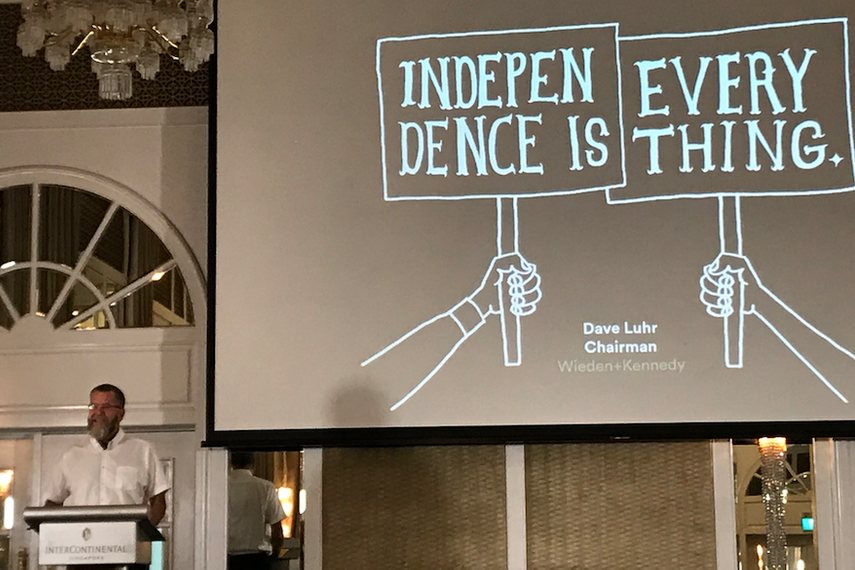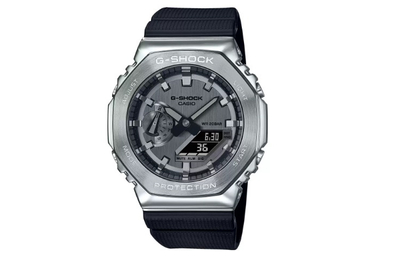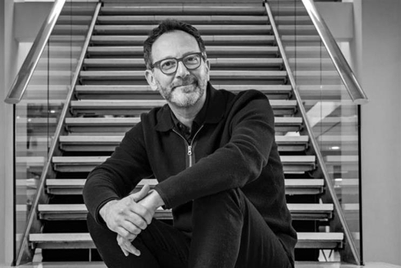
“I must say there’s nothing better than talking to a room full of independents,” Wieden+Kennedy chairman David Luhr enthused at the Worldwide Partners (WPI) global summit in Singapore this week. The bi-annual gathering brings together representatives of 70-plus independent agencies from around the world that are in WPI’s partner network.
Speaking on behalf of arguably the most successful independent ad agency on the planet, Luhr was clearly preaching to the converted and pulled no punches in alluding to the differences and changing fortunes of late between their kind and the large ad holding companies, with a warning for those tempted to join the publicly traded giants.
“I learned over the years that there are two types of agencies,” he said. The vast majority, he argued, care more about money than creativity and will put client needs ahead of doing the right thing. Yet those who care more about their culture and creativity more often will end up with a more profitable and sustainable business plan, he wagered.
“Those agencies who constantly chase profits—typically holding company agencies—never seem to escape that obsession,” he said. “Unfortunately, they’re now caught in a never-ending buying spree. They’re buying good agencies at super high valuations only to watch their profits and their creativity erode as they make that purchase. And then that agency loses its culture and then obviously loses its independence. And then they have to repeat the cycle again and again just to grow.”
This cyclical process, Luhr argued, has rarely worked well for either side. And while he didn’t mention recent specific acquisitions (most notably Droga5’s Accenture deal) by name, he challenged the agencies to find real benefits.
“I don’t need to name them, but a lot of great independent agencies over the years have sold out. And I would really ask anybody in this room, is there any independent agency who sold and five years later is a smarter agency? No name comes to mind for me.”
So why do agencies sell? Luhr says it’s more about pure exhaustion, due to the constant pressure of having to prove your agency's abilities. Plus, he added,“it’s obviously more about greed than it is about happiness or inspiration.”
Industry in flux
But fresh challenges in the industry now may be changing the dynamic between holding companies and independents. “The business is in a total shit show,” Luhr noted, rattling off the challenges in case agencies needed reminding:
- CMOs have lost their power to procurement departments
- Traditional high spend clients are losing their market share while high tech clients have yet to really understand the full value of marketing
- Projects rule the day with AORs becoming increasingly rare
- Clients let their stock price dictate strategy, which is at most, a 90-day planning window.
- Agency fees are in decline
- The industry is oversupplied with too many agencies fighting for reduced revenue.
While most of these issues affect independents and large agencies alike, Luhr argued it need not spell gloom and doom for everyone. The mistake holding companies are making, he argued, is by thinking in terms of short-term profits and chasing down too many avenues at once.
“You’ve read the headlines and you see what’s happening. And unfortunately, their investment in creativity is hollow," he argued. "They’re chasing every other fad but creativity.
“I hate to be harsh, but someone else's tragedy can be our opportunity. As independent agencies, we can excel during this time of transition, and emerge even stronger, with less competition, increase our authority, higher margins, and stronger reputations.”

And with that, Luhr presented six insights into what would help indie agencies do just that:
1. Excel at creativity
Focus on the work and talent so creativity can thrive. Top talent can be hard to deal with, but don’t give up on them. If you focus on the creative vision, business results will follow, as they did with W+K and KFC, erasing a decade of store sales declines, Luhr said.
2. Grow a culture, not just an agency
Too many agencies say the same things to appear competitive. Don’t be afraid to be different. Cultures can’t be concepted or shown on a reel. You need rituals, traditions, consistency, Luhr said. “We want to create a culture so damn sticky it will hurt your soul to leave.”
Luhr’s agency culture cocktail: One-third W+K superjuice, one-third people and one-third leadership teams. Shake it up and enjoy.
3. Find great client partners
“We’ve been truly blessed because we’ve had Nike,” Luhr said, which is fearless and does not back down from risk. But he bristled at the suggestion that creating for a partner like Nike is ‘easy’. Nothing about it is.
And even the best client in the world can’t be your only client, Luhr added, which is why he ensured the agency brought in other big client partners like P&G. But don’t be afraid to walk away from bad clients either, he warned, or your people will want to walk first.
4. Implant your brands into popular culture
Small budgets can do great things with social media sharing. Campaigns like their ‘Dilly Dilly’ work for Bud Light wouldn’t have happened without leveraging social.
5. Dream big
You’re either growing in the business or you’re in decline. Too many independents are satisfied with their share, but your best people want growth and will leave if you don’t provide this, said Luhr.
New business gives you the abiity to adapt, change and motivate staff. W+K has grown from 30 to 1440 employees but fought to keep its culture, he claimed. At the same time, don’t do what holding companies do and create offices where you don’t need them, he offered.
6. Stamina: Take the long view
This is the gift that independence gives us, Luhr said. If something isn’t working, shift focus and regroup, like W+K did with its London office, which succeeded when retooled with new leadership that produced an award-winning Honda ad.
“I just think the future of adveristing is in this room. The holding companies are going down,” Luhr concluded. "We have an amazing opportunity."
(This article first appeared on CampaignAsia.com)





.jpg&h=334&w=500&q=100&v=20250320&c=1)
.jpg&h=334&w=500&q=100&v=20250320&c=1)










.jpg&h=268&w=401&q=100&v=20250320&c=1)
.jpg&h=268&w=401&q=100&v=20250320&c=1)

